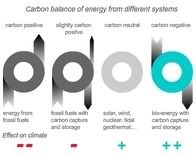RWE and AEP to test carbon capture and storage on hard coal-fired power plant in West Virginia
 American Electric Power (AEP) and RWE plan to collaborate in the testing of carbon capture and storage (CCS) technology for modern coal-based power plants. To this end, the partners have now signed a Memorandum of Understanding. Alstom will also participate in this project, which will be implemented on the AEP hard coal-fired Mountaineer plant (1,300 MW) in New Haven, West Virginia.
American Electric Power (AEP) and RWE plan to collaborate in the testing of carbon capture and storage (CCS) technology for modern coal-based power plants. To this end, the partners have now signed a Memorandum of Understanding. Alstom will also participate in this project, which will be implemented on the AEP hard coal-fired Mountaineer plant (1,300 MW) in New Haven, West Virginia.Alstom has developed a capture process based on ammonia that is to be used for the post-combustion capture of CO2 from flue gas. This process will be tested in a demonstration plant with an electrical capacity equivalent to 20 MW by capturing and scrubbing a corresponding slipstream from the flue gas. This way, up to 200,000 tons of CO2 are expected to be captured and stored on-site in deep saline formations – salt water-bearing strata – per year.
Biopact tracks developments in CCS, because the technology can be applied to biomass, resulting in carbon-negative energy and fuels. This kind of negative emissions energy, also known as 'bio-energy with carbon storage' (BECS) takes historic CO2 emissions out of the atmosphere. This sets it apart from both nuclear and renewables like wind, ordinary biofuels or solar, which are all 'carbon neutral' at best (schematic, click to enlarge, and see previous post, here and here).
Recently, RWE Power signed a collaboration agreement with BASF and Linde on the testing of new 'scrubbing agents' for capturing carbon in a pilot plant at RWE’s lignite-fired power plant site in Niederaussem (earlier post). Now it is joining American partners to validate the technology further.
Once the captured carbon is stored, the complete technology will have been tested. This area is managed by RWE's upstream subsidiary RWE Dea. The sub-project "storage", which will also be carried out by AEP, is subsidized by RWE Dea. Site-specific investigations of carbon storage capabilities, inter alia at the Mountaineer plant site, have been conducted in the US since 2002.
During the investigations, an approximately 2,740-meter exploratory well and seismic studies determined that the site was suitable for deep geological storage of CO2. Battelle Memorial Institute, a global science and technology enterprise and a leader in carbon storage research, is serving as the consultant on geological storage. RWE Dea will contribute its upstream and gas storage expertise.
The overall project – demonstration plant based on chilled ammonia and storage – is set to begin in 2009, provided that the application of this capture technology in a small-scale Wisconsin pilot plant operated by Alstom and the Electric Power Research Institute is successful. AEP and RWE are participating in this project as well:
 energy :: sustainability :: biomass :: bioenergy :: biofuels :: carbon capture and storage :: bio-energy with carbon storage :: carbon-negative :: emissions :: climate change ::
energy :: sustainability :: biomass :: bioenergy :: biofuels :: carbon capture and storage :: bio-energy with carbon storage :: carbon-negative :: emissions :: climate change :: Once commercial viability of the capture technology is validated at Mountaineer, AEP plans to use Alstom’s chilled ammonia process on one of the 450-MW coal-fired units at its Northeastern Station in Oologah, Oklahoma. This commercial-scale system is scheduled to be operational at the end of this decade. It is expected to capture about 1.5 million tons of CO2 a year. The CO2 captured at Northeastern Station will be used for enhanced oil recovery (EOR).
AEP and RWE are members of the e8, a non-profit international organization composed of the nine leading electricity companies from the G8 countries. The e8 promotes sustainable energy development through electricity sector projects in developing nations worldwide.
8 November 2007 - American Electric Power (AEP), RWE and Alstom will collaborate during a planned validation of commercial-scale application of carbon capture and storage technology on an existing AEP coal-fired power plant.
RWE will join a project AEP announced in March when it signed a deal with Alstom, for post-combustion carbon capture technology using Alstom's chilled ammonia process. RWE will also participate in an associated project for deep geological storage of captured CO2.
References:
RWE AG: RWE and AEP to test carbon capture and storage on existing Mountaineer hard coal-fired power plant in West Virginia - November 8, 2007.
Biopact: RWE Power, BASF and Linde to cooperate on CO2 capture technology - September 28, 2007
Biopact: A quick look at 'fourth generation' biofuels - October 08, 2007
Biopact: Carbon-negative bioenergy recognized as Norwegian CO2 actors join forces to develop carbon capture technologies - October 24, 2007
Biopact: Carbon-negative bioenergy is here: GreatPoint Energy to build biomass gasification pilot plant with carbon capture and storage - October 25, 2007
 --------------
--------------
 Biopact's Laurens Rademakers is interviewed by Mongabay on the risks of large-scale bioenergy with carbon storage (BECS) proposals. Even though Biopact remains positive about BECS, because it offers one of the few safe systems to mitigate climate change in a drastic way, care must be take to avoid negative impacts on tropical forests.
Biopact's Laurens Rademakers is interviewed by Mongabay on the risks of large-scale bioenergy with carbon storage (BECS) proposals. Even though Biopact remains positive about BECS, because it offers one of the few safe systems to mitigate climate change in a drastic way, care must be take to avoid negative impacts on tropical forests.








0 Comments:
Post a Comment
Links to this post:
Create a Link
<< Home